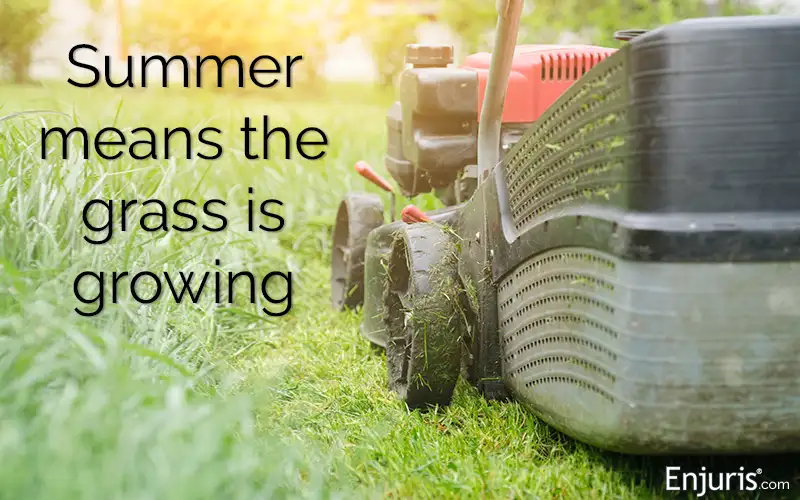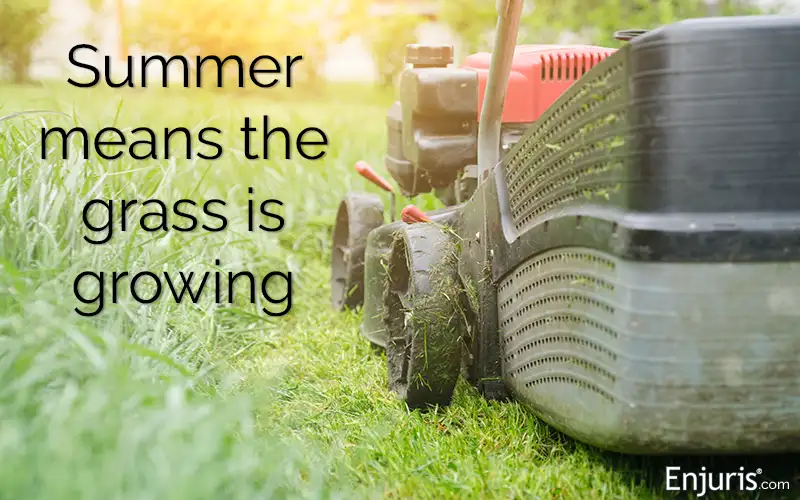[ad_1]

Do you wear flip-flops when you mow the lawn? You might think twice about that.
Lawnmowers can cause serious injuries, or even death.
For some people, summer means pool parties and vacations.
For others, it means we’ve entered the months where the lawn needs to be mowed every two weeks (more if you get a lot of rain). Whether you’re a dad in a sunhat and knee socks who embarrasses his kids with his lawn-mowing style (no judgment here!) or any homeowner who pops in their earbuds and cranks up the tunes while completing this chore… it’s an inevitable part of summer for lots of people.
Despite the fact that nearly every homeowner engages in lawnmowing during the summer, many aren’t aware that it can be dangerous. You also might not know who’s liable or what to do if you’re injured in a lawnmower accident.
The U.S. Consumer Product Safety Commission (CPSC) reports that about 76,000 people were treated in emergency departments for lawnmower-related injuries in 2019.
Injuries can happen to the mower operator, a bystander, or even children nearby or who are playing with the equipment. Injuries can happen with riding mowers or push mowers, though the risks vary slightly for each.
Common lawnmower injuries
- Cuts and lacerations typically occur when a person’s hand, foot, or other body parts come into contact with the blades or moving parts of the lawnmower.
- Amputations can potentially happen if fingers, toes, or even entire hands or feet are caught in the blades.
- Fractures and broken bones are the result of significant impact injuries from the powerful rotating blades.
- Burns can happen if the lawnmower’s engine or exhaust system malfunctions and causes a fire or explosion.
- Eye injuries from flying debris, like rocks, sticks, or grass clippings, can cause eye irritation, scratches, or more severe injuries.
- Soft tissue injuries like muscles, tendons, and ligaments can happen from sudden movements or impact.
- Head injuries range from minor bumps and bruises to more severe traumatic brain injuries if the user falls or is struck by a lawnmower.
A Johns Hopkins University study revealed that for every five lawnmower fatalities, one involves a child. Lawnmower accidents are the leading cause of child amputation injuries in the U.S.
How do lawnmower accidents happen?
There are four primary types of accidents from lawnmower use:
- The user fails to follow the manufacturer’s guidelines and safety procedures while using the mower;
- A bystander is injured by flying debris;
- A child (or other person) is run over or gets in the way of a moving lawnmower;
- The lawnmower has a defect that makes it inherently unsafe.
Who is liable for a lawnmower injury?
1. Manufacturer
Sometimes, a lawnmower injury results from a product defect that causes a malfunction. This area of law is called product liability. This allows a consumer or user to sue a manufacturer of a product that caused an injury.
There are three types of product liability claims:
- Manufacturing defect, which is when something went wrong in the manufacturing process. This could be a broken part, perhaps a screw wasn’t tight enough, maybe an incorrect part was used, etc. If the product had been manufactured properly, it would have been safe.
- Design defect, which happens when the design of the product makes it inherently unsafe. In other words, even if it’s manufactured or built exactly to its specifications, it was always unsafe and can cause injuries.
- Failure to warn, which would be when the manufacturer does not include appropriate instructions or warnings within the packaging to advise the user on how to use the lawnmower safely.
If the injury was from the mower, itself, attributable to any of these types of claims, you could file a lawsuit with the manufacturer. In some instances, particularly if the manufacturer is an overseas company, you might be able to file a lawsuit with the retailer where you purchased the mower. Sometimes you can file a lawsuit for a product liability claim even if you purchased the item used or from someone who wasn’t the original retailer.
2. Operator
If you’re a passerby and you’re injured by debris from a lawnmower or in some other way, you might be able to make a claim against the individual using the equipment. You would need to prove that the defendant is negligent for failing to follow appropriate safety procedures or avoid a reasonable risk of injury.
You might also be able to make a claim against the person who was responsible for the lawnmower’s maintenance and upkeep if that affected your injury.
3. Workplace lawnmower injuries
If you’re an employee and you’re injured by a lawnmower while doing your job, you’re likely eligible to file for workers’ compensation benefits.
The main aspect of workers’ compensation insurance is that it’s no-fault insurance, which means you don’t have to prove that anyone was negligent to receive benefits. You only need to show that you were at work or engaged in duties related to your job at the time of the accident.
States differ as to exactly what benefits you can receive, but you’ll be entitled to a percentage of your lost wages, medical treatment, disability pay, and survivor benefits for the dependents of a worker who was killed in an accident.
Lawnmower safety for children
- Don’t allow children to play nearby when you’re mowing the lawn. No matter how careful you are and how aware of their location, a child who is too close can be hit by a projectile from the mower. It can either be something that is sucked into the blades or could be hit by the mower, itself—like rocks, small toys, etc.
- Don’t allow a child to play on a riding mower (or play with a push mower). Even if it is turned off, a child could accidentally engage the motor and be severely injured on a moving blade.
- Don’t allow your child to ride the mower with you. This seems like it might be fun, but a child can fall off the mower in a second and fall into the blades’ path.
Lawnmower safety for everyone
- Know where your children and pets are before you mow (and that they are a safe distance away)
- Check the area to be mowed for debris, rocks, sticks, or other objects that could become a projectile
- Wear closed shoes (not flip flops or sandals)
- Wear eye protection and hearing protection
- Don’t refuel the motor unless it is turned off and cooled
- Use a push mower with automatic shut-off, or that stops all motion when the handle is released. If you use a riding mower, ensure there’s an auto shut-off when the rider isn’t in the seat.
- Use caution on hills and sharp turns so the mower doesn’t tip over.
- Don’t be in the path of the lawnmower’s exhaust (and make sure no one else is, either). You can suffer a serious burn from hot lawnmower exhaust.
- Do not remove the grass catcher or unclog the discharge chute until the mower is completely shut off.
[ad_2]



